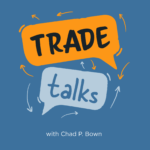Trade Talks
188. Did responsible sourcing by multinationals help workers in poor countries?
Play Episode
Pause Episode
Mute/Unmute Episode
Rewind 10 Seconds
1x
Fast Forward 10 seconds
00:00
/
39:29
Subscribe
Share
What happened to workers and others in Costa Rica when global companies imposed new responsible sourcing codes of conduct on their suppliers.
Trade Talks
187. Industrial policy and the rise of Romania’s Silicon Valley
Play Episode
Pause Episode
Mute/Unmute Episode
Rewind 10 Seconds
1x
Fast Forward 10 seconds
00:00
/
51:22
Subscribe
Share
How a 2001 income tax break for Romanian software programmers helped transform the country’s information technology sector.
Trade Talks
186. How US lead regulations hurt Mexican babies
Play Episode
Pause Episode
Mute/Unmute Episode
Rewind 10 Seconds
1x
Fast Forward 10 seconds
00:00
/
31:55
Subscribe
Share
Higher US lead standards in 2009 resulted in more production and pollution from Mexican plants. Nearby infants and kids suffered.
Trade Talks
185. The historic collapse of Switzerland’s watch industry
Play Episode
Pause Episode
Mute/Unmute Episode
Rewind 10 Seconds
1x
Fast Forward 10 seconds
00:00
/
28:36
Subscribe
Share
New quartz technology and competition from Japan devastated the dominant Swiss watch industry of the 1970s. What happened next?
Trade Talks
184. The US-EU fights over electric vehicles and the Inflation Reduction Act
Play Episode
Pause Episode
Mute/Unmute Episode
Rewind 10 Seconds
1x
Fast Forward 10 seconds
00:00
/
46:28
Subscribe
Share
EVs headlined the transatlantic dispute over the Inflation Reduction Act. That feud may be over, but other conflicts remain.
Trade Talks
183. How the United States cleaned up container ship pollution
Play Episode
Pause Episode
Mute/Unmute Episode
Rewind 10 Seconds
1x
Fast Forward 10 seconds
00:00
/
24:36
Subscribe
Share
In 2012, the EPA started regulating maritime emissions of air pollutants. The shipping industry’s response offers lessons for other countries.
Trade Talks
182. Is China’s industrial policy working?
Play Episode
Pause Episode
Mute/Unmute Episode
Rewind 10 Seconds
1x
Fast Forward 10 seconds
00:00
/
44:08
Subscribe
Share
The “Made in China 2025” subsidies both provoked a trade war and inspired similar moves by the US and other economies. But have they worked?
Trade Talks
181. US-China trade war fallout: This is what decoupling looks like
Play Episode
Pause Episode
Mute/Unmute Episode
Rewind 10 Seconds
1x
Fast Forward 10 seconds
00:00
/
45:43
Subscribe
Share
How do we reconcile “record-level” US-China imports and exports when tariffs remain on more than half of trade between the two economies?
Trade Talks
180. The WTO is in trouble. Econ 101 to the rescue?
Play Episode
Pause Episode
Mute/Unmute Episode
Rewind 10 Seconds
1x
Fast Forward 10 seconds
00:00
/
1:10:41
Subscribe
Share
How understanding the WTO’s past can help foster its revival – including for policy challenges like climate and China’s non-market economy.
Trade Talks
179. Why Taiwan restricts high-tech investment into China
Play Episode
Pause Episode
Mute/Unmute Episode
Rewind 10 Seconds
1x
Fast Forward 10 seconds
00:00
/
35:40
Subscribe
Share
For decades, Taiwan has limited how and how much its tech firms like TSMC could invest in mainland China. Are there lessons for the United States?
